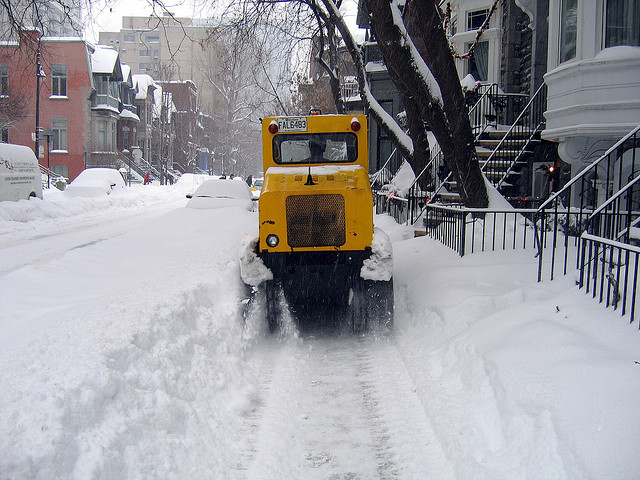What's that sidewalk snowplow pushing? Complacency, alienation, obesity...
It comes in the night, disrupts our sleep, blocks the driveway and rips the grass, and leaves in its wake what it touches at its point. I refer, of course, to the sidewalk plow.
When I was a lad in Holland, Mich., I use to thrill at the sight of the sidewalk plow, and thought it must be, along with Zamboni driver and professional baseball player, the best job in the world. I’ve grown to loathe these snow beasts, for they also symbolize how governments can disrupt the obligations, and thus the cultivation, of neighborliness.
They do not come cheaply. The city of Holland pays about $120,000 per plow and earmarks roughly $57,000 a year for the service. Under its sidewalk fund, the city of Wyoming in 2010 spent over $363,000 on snow removal. Then too, there is the problem of emissions.
A sidewalk, as part of a front yard, designates the brackish area connecting private and public life. We might rightly judge a person’s public spiritedness by how well he keeps his lawn trim or his house in repair. We wouldn’t expect the government to do those things, but we would rightly accuse the person next door who didn’t do those things of not caring about his property, and thus devaluing our own.
One could use the blunt instrument of the law to legislate those murky areas where public life and private life blend together. The Virginia Articles of 1610 insisted that “Every man shall have an especiall and due care, to keepe his house sweete and cleane, as also so much of the streete ... as will answere the contrarie at a martiall Court.” While we may be uncomfortable with this level of coercion, it does address the problem of how we might make good neighbors out of individuals, without which social life breaks down very quickly. Many municipalities do insist as a matter of law that individuals clear their walks. Ann Arbor, for example, has a clearing ordinance, but more importantly identifies the act as one of “courtesy and caring.” Is this legislating morality? You bet it is.
Which brings us back to the sidewalk plow. Government plowing a sidewalk attenuates rather than strengthens the sinews of neighborliness. A people who can’t keep their own walks clear are unlikely to take on the more arduous tasks of citizenship. And in an age where obesity is widespread, the health benefits of shoveling can hardly be overstated.
It may be objected that some individuals can’t shovel their walks. If we don’t know our neighbors well enough to know if they need our help, and if we do know they need our help and refuse it to them, then we are hardly the sorts of persons capable of self-governance, belief in which requires belief in self-reliance and care for one’s place. If growth in personal responsibility is not encouraged and attained, then the clumsy inefficiencies of participatory government will inevitably yield to a regulatory officialdom satisfied to rule over contented sheep.
It may be argued that I have no obligation to serve my irascible neighbor. G.K. Chesterton observed that the Bible demands we love our neighbors and our enemies because, more often than not, they’re the same person. Mutually maintaining public spaces on private properties seems a minimal expectation of free persons, whether they get along or no. When the government engages in acts such as clearing our walks it encourages a retreat into private life that destroys the public realm. It encourages selfishness.
The good citizens of Traverse City have this figured out. Recreation trails there are being cleared by citizen volunteers committed to ensuring people have safe places to walk. Even more impressively, El Grupo Norte Youth Cycling pulls behind bikes plows “built and designed locally by our neighbors, Mr. Otwell and Dr. Auer” to keep sidewalks and trails clear. As they say: "Pulling the plow isn’t easy though. You will work. Your legs will burn. Your heart will pound. But, you’ll have fun doing it. ... Get fit and help your neighbors in the process.”
An enlightened sentiment by an enlightened and free people who stay fit, save money, cut down on emissions, and serve their neighbors. Others should take note.
See what new members are saying about why they donated to Bridge Michigan:
- “In order for this information to be accurate and unbiased it must be underwritten by its readers, not by special interests.” - Larry S.
- “Not many other media sources report on the topics Bridge does.” - Susan B.
- “Your journalism is outstanding and rare these days.” - Mark S.
If you want to ensure the future of nonpartisan, nonprofit Michigan journalism, please become a member today. You, too, will be asked why you donated and maybe we'll feature your quote next time!


 Want a closer neighborhood? Ditch the expensive sidewalk snowplow and clear your own walks. And your neighbors'. (Photo by Flickr user Simon Law; used under Creative Commons license)
Want a closer neighborhood? Ditch the expensive sidewalk snowplow and clear your own walks. And your neighbors'. (Photo by Flickr user Simon Law; used under Creative Commons license)